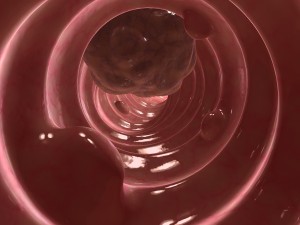At this point there is no reliable specific blood test, which would allow colon cancer screening for the masses. However, a combination of the following tests are useful to come to a diagnosis (Ref. 1,2 and 3):
1. Test stool for occult blood
As mentioned above, we know that 85% of cancers develop from polyps, which can and do erode and shed microscopic amounts of blood into the stool. This cannot be seen, but it can be tested for.
There are very sensitive screening tests available (“stool for occult blood”- testing). Three different stool samples are spread onto a special cardboard container. One of them that is very popular is by Immunostics,Inc., 3505 Sunset Ave., Ocean, New Jersey 07712. The lab or the physician’s office can then add a developer substance, which colors the stool sample, if it contains blood. It fails to color it, if there is no blood in it. There are a small number of false positives and false negatives, but it is the best test that we have at the present time.
2. Rectal examination
Quite a few rectal cancers or polyps can be reached this way and this test can be done by the examining physician.
3. Flexible sigmoidoscopy
This test procedure is easily available by the gastroenterologist and reaches 60% of colorectal cancers, which almost can replace the rectal exam.
4. Colonoscopy
A full length colonoscope is used to do a colonoscopy of the entire colon. Most colon cancers in the past used to be in the rectum or sigmoid colon. But in the last decades more and more cancers are found also in the transverse and in the ascending colon, which is only accessible by a full length colonoscopy, where the entire rectum and colon is visualized.
Screening recommendation
High risk family members with any of the genetic syndromes with multiple colonic polyps should have a colonoscopy done in regular intervals from age 35 onwards. Other people ideally should have this test from age 50 or 55 onwards as a baseline. For more on the effect of colonoscopy see this blog.
Testing for occult blood should be started at age 40 for everybody and then done on a yearly basis. This is the only method apart from a colonoscopy to know whether or not there are polyps present. Unfortunately different health care plans are not always supportive of this screening procedure, but they will pay for taking care of your cancer when it is too late.
Future blood screening tests
In future there likely will be a screening test available that would involve monoclonal antibodies, which will test for a group specific tumor antigen for rectal/colon cancer (similar to the PSA test for prostate cancer). At the present time the carcinoembryonic antigen (=CEA ) test is available, but unfortunately only a minority of colon cancer patients are positive for this.
Metabolites in urine
Another line of research is very promising (see Ref. 9). Dr. Haili Wang, a surgeon at the University of Alberta Hospital, presented a paper from a study involving metabolites in urine to distinguish between healthy subjects and those who are carriers of colonic adenomatous polyps. The urine samples were tested with nuclear magnetic spectroscopy (NMR) and analyzed with software from Chenomx Inc of Edmonton. The urine test had a specificity of 80.6% and sensitivity of 81%. The researchers concluded: “This is the first study to demonstrate that NMR urine metabolomics has the ability to distinguish normal healthy subjects from patients with adenomatous polyps with far superior accuracy than that of current fecal based screening tests”.
Occasionally the doctor might still order a Barium enema test, but this has largely been replaced by colonoscopy.
More information about colonoscopy: http://www.askdrray.com/march-is-colorectal-cancer-awareness-month-so-lets-discuss-prevention/
References
1. Cancer: Principles &Practice of Oncology, 4th edition, by V.T. De Vita,Jr.,et. al J.B. LippincottCo.,Philadelphia, 1993.Vol1. Chapter on Cancer of the colon.
2. Cancer: Principles&Practice of Oncology. 5th edition, volume 1. Edited by Vincent T. DeVita, Jr. et al. Lippincott-Raven Publ., Philadelphia,PA, 1997. Chapter 32, Section 7: Cancer of the colon.
3. The Merck Manual, 7th edition, by M. H. Beers et al., Whitehouse Station, N.J., 1999. Chapter 34, page 328-330.
4. S Srivastava et al. Clin Cancer Res 2001 May;7(5):1118-1126.
5. RF Holcombe et al. Cancer Detect Prev 2001;25(2):183-191.
6. S Kinuya et al. J Nucl Med 2001 Apr;42(4):596-600.
7. D Chen et al. IEEE Trans Med Imaging 2000 Dec;19(12):1220-1226.
8. B. Sears: “The age-free zone”.Regan Books, Harper Collins, 2000.
9. “Fecal occult blood tests (FOBT): Farewell forthcoming?” The Medical Post Vol 47, No. 6, page 1 and 6.







